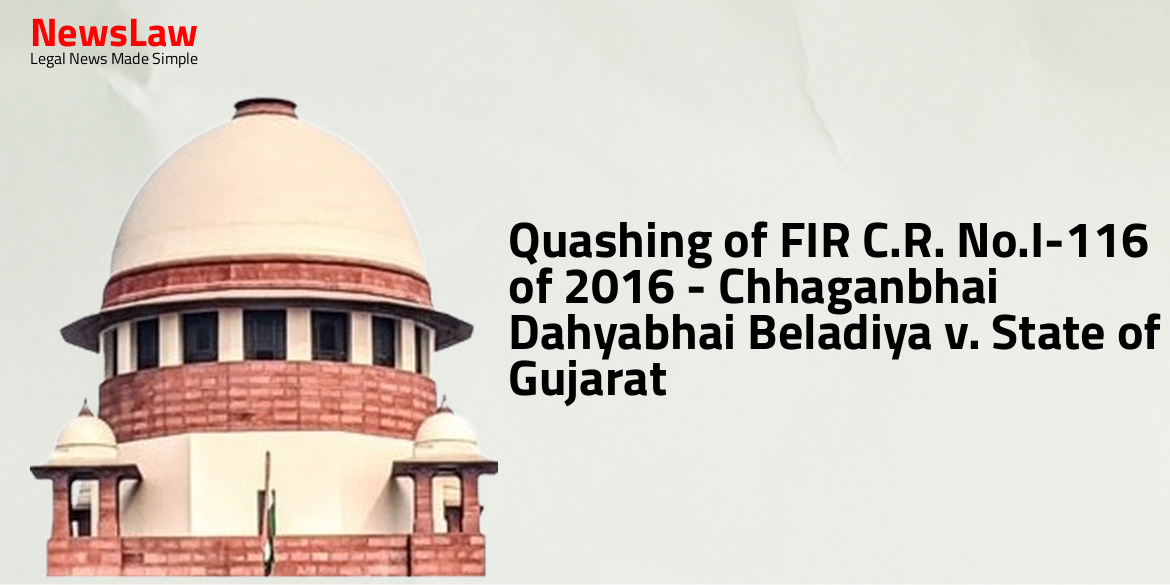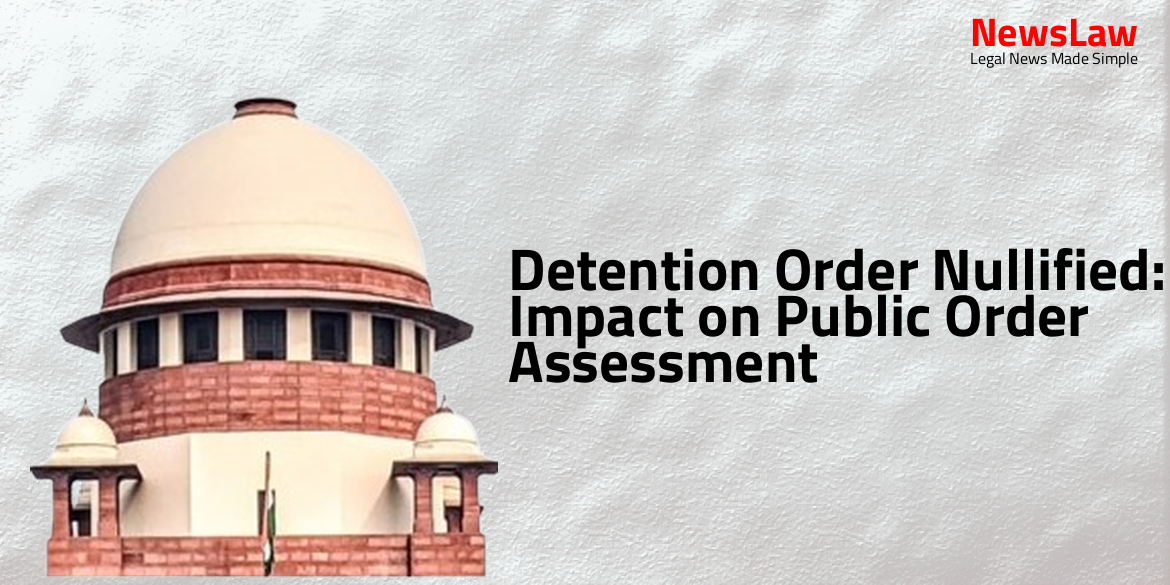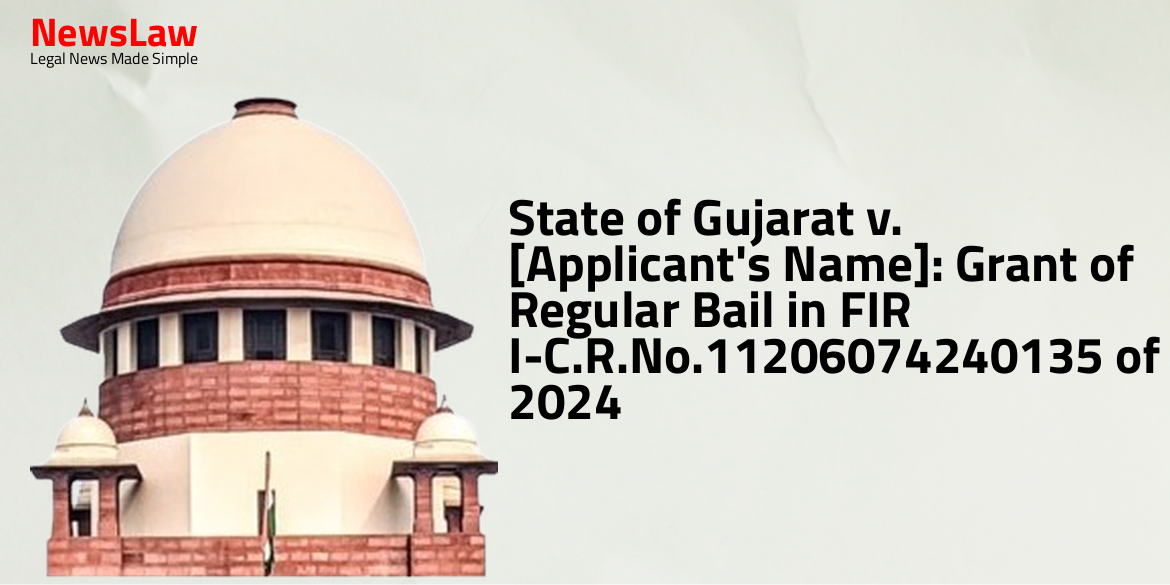In a significant ruling by the Gujarat High Court, the case of Chhaganbhai Dahyabhai Beladiya v. State of Gujarat regarding FIR C.R. No.I-116 of 2016 has been disposed off. The court observed the mutual settlement reached between the parties and decided to quash the FIR and consequential proceedings. This judgment showcases the court’s consideration of peaceful resolutions and the interests of justice. #HighCourtJudgement #LegalCase #QuashingFIR
Facts
- Applications seek quashing of FIR C.R. No.I-116 of 2016 registered at Sarthana Police Station, Surat.
- FIR pertains to offences under sections 306, 120B and 114 of the Indian Penal Code.
- Both applications heard together due to challenge being to the same FIR.
- Applications disposed off by common judgment and order.
Issue
- The main issue in this case is the validity of the new tax law introduced by the government.
- The primary question to be answered is whether the new tax law is in compliance with the Constitution of India.
- The parties involved have presented their arguments regarding the constitutionality of the new tax law.
- The decision on this issue will have significant implications for the taxation system and government revenue.
Arguments
- The deceased executed a divorce deed alleging extramarital affair with another woman.
- No other major allegations are leveled against the applicant.
- Allegations in the FIR state that the applicant created a fake Facebook account to meet the deceased.
- The suicide note left behind by the deceased was questioned for authenticity as no handwriting samples were provided.
- The applicant filed a complaint against physical and mental torture by the deceased and family.
- There is no evidence of instigation or direct involvement of the applicant in the deceased’s suicide.
- The applicant’s wife and brother-in-law allegedly caught the deceased due to suspicion of an extramarital affair.
- Another applicant is said to have been engaged with the deceased’s wife before marriage and has no direct connection to the offense.
- Two children were born out of the marriage, aged 9 and 4 at the time of the incident.
- Learned advocate Mr. Manan Paneri appearing for the respondent submits that the parties have mutually arrived at an amicable settlement.
- The settlement has been reduced to writing by way of filing an affidavit affirmed by the complainant.
- The respondent has no objection to the applications being allowed and the impugned FIR and consequential proceedings being quashed and set aside.
Analysis
- The High Court has the power to quash criminal proceedings if the compromise between the offender and the victim makes conviction unlikely and continuing the case would be oppressive to the accused.
- The power to quash criminal proceedings is distinct from compounding offenses under Section 320 of the Code.
- The High Court must consider the nature and gravity of the crime before quashing criminal proceedings.
- Offenses like murder, rape, dacoity cannot be quashed, while civil-flavored offenses arising from commercial, financial, matrimony, or family disputes may be quashed if the parties have settled.
- To quash a criminal proceeding after settlement, it must be found that continuing the proceedings would be futile and against the interests of justice.
- In cases of abetment to suicide, there must be proof of direct or indirect incitement.
- Settlement of disputes can lead to quashing of criminal proceedings to ensure peace and the ends of justice are met.
- Serious offenses like murder cannot be quashed even with a settlement between the victim and the offender.
- The High Court’s power under Section 482 of the Code is broad but must be exercised cautiously, especially in serious cases.
- Compromise between victim and offender does not justify quashing proceedings for offenses with significant societal impact.
- Settlement between victim and offender does not apply to offenses under special statutes like Prevention of Corruption Act or those by public servants.
- The High Court can undo wrongs and prevent unnecessary judicial processes in the course of justice administration.
- Full and substantial justice must be the aim when exercising the power to quash criminal proceedings.
- The duty of the courts is to encourage genuine settlements of matrimonial disputes.
- The court should not be hesitant in exercising its extraordinary jurisdiction in matrimonial matters.
- If parties settle disputes amicably, even if non-compoundable, the court can quash proceedings under Section 320 of the Code.
- The power under Section 482 should be used sparingly and only in appropriate cases where it would serve the ends of justice.
- The court must exercise such power based on the facts and circumstances of each case for the administration of real and substantial justice.
- Section 482 of the Code and Article 142 of the Constitution enable the courts to pass orders for genuine settlements of disputes.
- From the affidavit filed by the complainant, it appears there is no monetary settlement between the parties.
- The parties may have come to a truce and buried their differences amicably.
- No fruitful purpose would be served by asking the applicants-accused to face trial.
Decision
- The applicants, Original Accused No.1 and 2, have reached an amicable settlement during the pending Criminal Case.
- The complainant, Chhaganbhai Dahyabhai Beladiya, has filed an affidavit stating no dispute exists and has no objection to quash the FIR and proceedings.
- The FIR CR No. I-116/2016 under Section 306, 120B and 114 IPC was registered at Sarthana Police Station, Surat.
- The investigating officer has filed a charge sheet leading to Sessions Case No. 258 of 2021 before the 6th Additional District & Sessions Judge in Surat.
- The complainant filed an affidavit willingly without coercion on October 26, 2023.
- Abetment of suicide under Section 306 IPC requires abetment and intention of the accused to aid the deceased in committing suicide.
- Mere harassment does not alone constitute abetment of suicide.
- Both applications to quash the FIR are allowed, and consequential proceedings are terminated.
Case Title: RAKESHBHAI DULABHAI DHAMELIYA Vs. STATE OF GUJARAT
Case Number: R/CR.MA/17475/2017



